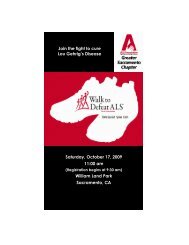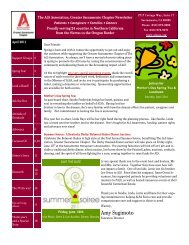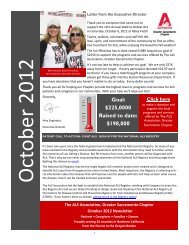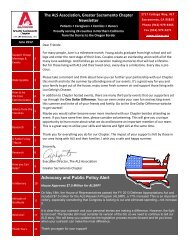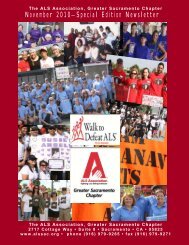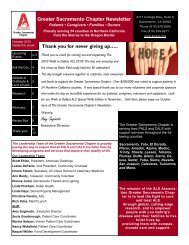The ALS Association, Greater Sacramento Chapter November 2012 ...
The ALS Association, Greater Sacramento Chapter November 2012 ...
The ALS Association, Greater Sacramento Chapter November 2012 ...
You also want an ePaper? Increase the reach of your titles
YUMPU automatically turns print PDFs into web optimized ePapers that Google loves.
Ask the Doc: Q & A with Edward Kasarskis, MD, PhD<br />
Edward Kasarskis, M.D., Ph.D. is Director of the multidisciplinary <strong>ALS</strong> Center at the University of Kentucky Neuroscience Center in Lexington,<br />
Kentucky, professor in the Department of Neurology at the University of Kentucky, and Chief of Neurology at the VA Medical Center in Lexington<br />
KY.<br />
Q: What is the best way to support your loved one at an <strong>ALS</strong> <strong>Association</strong> Clinic appointment<br />
A: This is an important question because the role of the caregiver, usually a spouse, is perhaps<br />
the single most important factor in effectively dealing with <strong>ALS</strong>.<br />
Dr. Kasarskis<br />
In our clinic, we frequently comment among ourselves that we do not really understand how a caregiver physically<br />
can do this day in and day out. While most physicians and other health professionals have never actually experienced<br />
giving daily direct care to an <strong>ALS</strong> patient ourselves, here are a few thoughts "from the outside looking in."<br />
Caregiving can be overwhelming and exhausting, meeting the physical and emotional needs of someone you love<br />
while also managing the details and stresses of running a household, and possibly fulfilling the role of a parent of a<br />
school age child in addition. So, how do they do this<br />
Preparation. Before you come to the clinic, be prepared. Bring a list of all the medications your spouse, partner, parent,<br />
or family member is taking, with the specific doses and other details. Better yet, bring all your medicines in a<br />
zip-lock bag. Also be sure to write down a list of all your questions large and small so you’ll really remember to ask<br />
them. It’s just like keeping a running grocery list at home so you don't forget anything important when you go to the<br />
store. Having the list really helps.<br />
Communication. In addition to the questions you bring with you, be sure to ask about anything you don’t understand<br />
as you talk with the <strong>ALS</strong> neurologist, respiratory therapist, physical therapist, nutritionist, occupational therapist,<br />
and nurse. If you don’t understand something or if you are unsure how to execute something they’re suggesting,<br />
get more information or even ask for a demonstration. This may be particularly true in the case of PT and OT<br />
recommendations.<br />
Take a notepad and take notes so you can review them later when you have more time. Bring your iPad to watch a<br />
video demonstration about transfer techniques. Some suggestions will sound easy enough at the clinic but when you<br />
get home, you may find you have more questions. Much of the journey with <strong>ALS</strong> is on-the-job training. You keep<br />
learning new things as the situation changes. Sometimes when you’re in the clinic you’ll find you’ll be working with<br />
the <strong>ALS</strong> team to solve a problem that is specific to you. <strong>The</strong> most successful caregivers and patients work together<br />
with the <strong>ALS</strong> team to actively problem solve, communicating what they think is the best approach given their circumstances,<br />
and what they do and do not understand.<br />
Confidence in going forward. <strong>The</strong> Clinic Team will outline a general roadmap for the future, indicating the next likely<br />
challenge and alerting you to the potential solutions. For example, this might be something like, "On the next visit<br />
we will be discussing and probably recommending a gastrostomy tube for nutritional support." Sometimes that may<br />
be psychologically difficult to hear. Who wants to face a problem before they have to But knowing you’re ready for<br />
what may happen next perhaps having a walker ready, or understanding what communication devices will be available<br />
to you should you need them helps reduce the innate resistance to change and problems, and ensure you will<br />
have what you need when you need it.<br />
Confidence in going forward also comes from taking care of yourself physically and emotionally. I know, that’s easier<br />
said than done when you’ve got so much on your shoulders. Remember that your health and wellbeing are critical to<br />
the health and wellbeing of your loved one. If you get run-down, you risk personal injury and illness while you are<br />
helping your family member with <strong>ALS</strong>.<br />
So if you can, get help from someone to assist you in running your day-to-day activities and managing the chores,<br />
errands, and hassles of everyday life. Try to minimize fatigue by building in breaks and doing things just for yourself:<br />
taking a walk or seeing friends at the corner coffee shop. Having some personal time is priceless and important.<br />
Make sure you can regularly have a little respite from your virtual non-stop responsibilities.<br />
9






